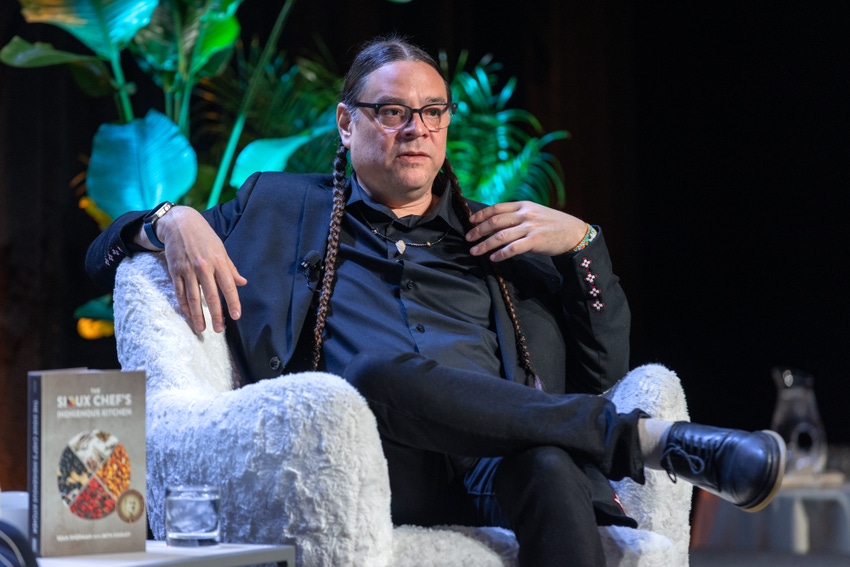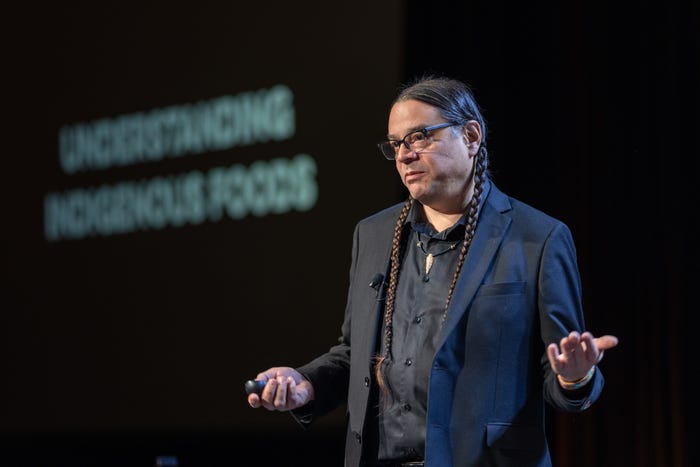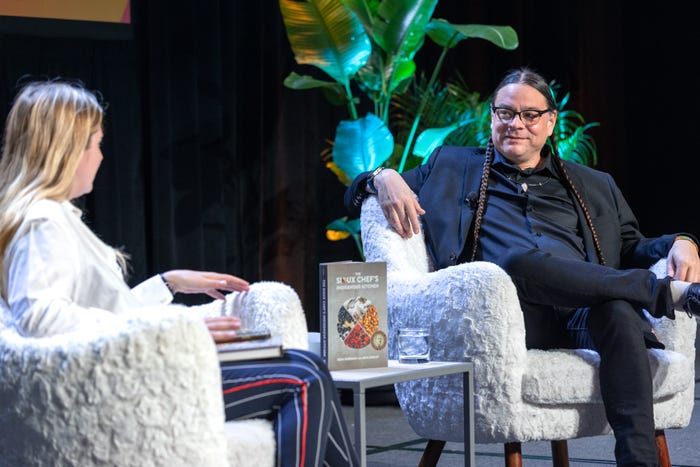The Sioux Chef advocates for upending today’s Eurocentric food system
While growing up on government cheese, Sean Sherman realized he didn’t know the food of his heritage. Here are the highlights of his keynote at Expo West.
April 5, 2024

Sean Sherman, “The Sioux Chef” who runs the Owamni restaurant in Minneapolis, Minnesota, chose to “wake people up a little bit“ about the need to decolonize a Eurocentric food system in his keynote speech at Natural Products Expo West in March.
Much of his talk focused on the atrocities Indigenous peoples have faced in the United States and how that history continues to present barriers to change. But he also infused humor and a little cursing into his keynote, and he presented solutions.
Take in these highlights, then watch Sherman’s speech, which is available on demand.

The Sioux Chef, Sean Sherman, addresses colonialism in the U.S. food system at Natural Products Expo West in March 2024. Credit: Bryan Beasley Photography
Indigenous diets were hidden from Indigenous people
Like his fellow Oglala Lakota tribal members, Sherman grew up eating commodity foods—corn syrup, government cheese, overly salted vegetables, sugared fruits, canned meats with juices.
“It’s ‘with juices’ that really sells the product, right?” he half-joked.
It wasn’t until he started working in restaurants at age 13, eventually moving his way up to executive chef, that he began to question “the complete absence of my own heritage food,” Sherman said. “I couldn’t go online and order ‘The Joy of Native American Cooking’ because that didn’t exist.” In 2017, Sherman published The Sioux Chef’s Indigenous Kitchen; a new edition is expected this year.
Realizing this gap started him on his life’s path.
But learning how to shift food gears—not just for himself but for his people and anyone else with genuine, rather than capitalistic, interest in Indigenous food practices—required gaining a better understanding of history, one that’s been written to protect the winners.
Colonialism continues to hurt Indigenous people
Colonialism, the practice of acquiring full or partial political, social and cultural control over another country, began in America in earnest in the late 1700s with European settlers. The impact was almost instantaneous, and it’s rarely discussed in textbooks, Sherman said. As the colonists carved out tribal lands for their own gain, they forced Indigenous peoples (if they didn’t kill them) to change religions, clothes, hairstyles, foods and community values—all in ways that hurt these communities to this day.
“Even in the very first document that the Founding Fathers of America [wrote], they dehumanize us right away just by calling all Indigenous peoples ‘merciless Indian savages,’” Sherman said. “That’s the tone that carries on for the next century and even into today's world. There's still a lot of deep racism out there.”
Sherman reviewed a huge swath of history, outlining various treaties, congressional acts and directives from vaunted figures including George Washington that allowed colonists to steal tribal lands. To accomplish those goals, he added, the government promoted the killing, enslaving and institutionalizing of Indigenous people.
In fact, the bounty system was rampant. For example, California paid “upwards of $200 for the body parts of an Indigenous people,” Sherman said. “Not only were communities being slaughtered, but those bodies would be chopped up, brought back into town and then they'd be cashed in.”
And considering the value of $200 back in 1863, “It’s an immense amount of money that was paid out by the newly formed government of California, which was paid back by the United States government,” Sherman added. In other words, he said, this was “state- and federally sponsored genocide.” Minnesota, where Sherman now lives, also had a bounty system.
Colonizers also did away with heirloom varietals of seeds, from which Indigenous tribes grew their crops, and stamped out the bison population, removing a staple in many native peoples’ diets. All of this, Sherman said, “was a really intentional move” that led to the widespread loss of cultural practices and values and contributed to the formation of the commodity food system. It also set the stage for the government to assimilate American Indians into European culture, eradicating Indigenous education practices, Sherman said.
“Countless generations of knowledge … should have been downloaded to us as Indigenous peoples,” Sherman said. This included “how to live, how to identify plants, how to find medicine, how to know which parts of the plants to harvest, how to utilize all the parts of the animals … passing down everything like all the stories, all the religions, all the songs. All of that education is wiped away during the turn of the century after we’re pushed into reservation systems.”
From there, U.S. officials forced Indigenous children into European-style school systems, taking them out of their homes and communities and placing them into military- or religiously run institutions. This subjected the kids to major trauma, Sherman said, including physical, mental and sexual abuse and even death. That trauma, he noted, has carried down through the generations.

Sean Sherman, also known as The Sioux Chef, speaks with Chloe Sorvino, Forbes Magazine food and agriculture staff writer, at Natural Products Expo West in March 2024. Credit: Bryan Beasley Photography
Working to reclaim indigenous culture
One question Sherman often encounters is why Native American restaurants aren’t “all over the place.”
To that, he reminds people that we’ve “barely had a moment to catch our breath from this awful history that just happened. But now we're at a place where we have a lot of very smart Indigenous peoples coming up and understanding how to work our culture back into things and [understanding] how to reclaim a lot of our culture.”
Sherman is one of those leaders forging the way back to heritage foods and working to remove the disease-causing commodity goods distributed by the government.
“It's one thing to understand the history, but now it's another thing to unpack what Indigenous food systems are—and it's really about diversity,” Sherman said.
With thousands of tribes throughout Canada, the U.S. and Mexico, “just imagine all the different flavors, foods, languages and stories that can come out of that, that you could experience instead of just seeing the same thing over and over and over again,” Sherman said, referring to the homogenized menus prominent throughout North America.
“I feel like I could almost write the menu before I walk in a restaurant because it's always the same stuff,” he said. “It’s always a bourbon bacon cheeseburger, some kind of Caesar salad, some buffalo-fried cauliflower—whatever is the hot topic at the moment.” He calls these types of restaurants “keyword cafés” because “they're always the same; there's nothing creative about it.”
But Indigenous people bringing Indigenous dishes and expertise to the mix invites diversity and inspires discovery. Owamni, for instance, serves insects, going through roughly 15 pounds of crickets per week.
Sherman also strives to reclaim his ancestors’ plant knowledge. “If you just take the time to stop calling everything a weed and realize that every plant has a name and most plants have a purpose, there's so much out there for food, for medicine … crafting, lodging, clothing, tools, weapons,” he said.
Finally, Sherman called for an end to industrialized agriculture. “This is a very dangerous way of creating a lot of foods,” he explained. “We do need massive food production, but we need more diversified ways and we need less companies that are pushing chemicals on everything to control our food.”
The solution? A shift to native and Indigenous agriculture, which focuses on local and native foods, and regenerative practices.
“We should be stewarding and protecting the seeds of everything we have because so many of these large companies are trying to trademark these seeds for the sake of just controlling your foods,” Sherman said. “And we have to remember that each one of these seeds comes from very particular communities with very particular stories.”
That’s why it’s so important that seeds remain in the hands of Indigenous peoples, he added, who know the stories and have deep respect for the seeds. “It’s not about commodification,” he said. “It's about keeping these things alive because they're living beings.”
How to decolonize the food system
“We need more cultural food producers; we need regional food systems,” he said. “We need our local control, which means nongovernmental control. And I think tribes are in a good place to be able to define their own food laws and food codes if they really, really want to, and also access to our Indigenous education and environmental protections to protect what's around us. We need those pieces to get there.”
Achieving that starts by shifting the power “from companies and government … back towards ourselves,” Sherman said. Although we are taught to believe that if we want food, we have to buy it, he added, that's not necessarily true.
Sherman is propelling this power shift through his nonprofit, North American Traditional Indigenous Food Systems (NĀTIFS). The organization owns the Owamni restaurant, provides access to Indigenous practices and techniques through its Minneapolis food lab, supports Indigenous food producers and employs Indigenous people. Furthermore, NĀTIFS is moving into wholesale to deliver food directly to universities, hospitals, penitentiaries.
Change requires funding
These efforts require funding. Sherman is on a mission to secure $20 million in capital to underwrite plans for just the next five years.
“If you guys have $20 million in your pocket, there's a donation box by the front door,” he joked.
Fortunately, Sherman, as the keynote speaker, happened to be in front of investors looking for their next opportunity. That’s an exciting development, especially given Sherman’s background.
Creating a business “was a journey for me,” he said. “I didn't grow up with money. There was no education around it. I didn't know how to talk to bankers. They were scary. … You just feel like you're stuck in a rut all the time because the systems are built against you, especially when you're somebody of color and you don't come from extreme wealth.”
As Sherman explained, a lot of wealth comes from land ownership, and a lot of land ownership comes from the elimination of Indigenous peoples. “So we have to really understand that, because other people will say, ‘I had nothing to do with it, that was so long ago,’” he said. “But it’s like, well, your family wealth comes from someplace, and a lot of times in American history, it comes from land.”
Watch Chef Sean Sherman’s keynote on demand here.
About the Author(s)
You May Also Like




